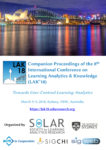
It is with great pleasure that we welcome you to Sydney, Australia, for the 8th International Conference on Learning Analytics and Knowledge (LAK18). The Conference is organised annually by the Society for Learning Analytics Research (SoLAR) and is hosted this year by The University of Sydney.
The aim of the conference is to provide a forum for presentation, exchange and discussion of research and practices related to the transdisciplinary field of learning analytics. This year we received 355 submissions, a record number. We offer an extensive program including a Research track (35 full papers, 26 short papers, four extended abstracts, and 17 posters and demonstrations) and a Practitioner track (11 full papers, two short papers, nine posters and demonstrations). The program begins with six full-day workshops, 13 half-day workshops and our fourth hackathon, which runs over two days. Our sixth doctoral consortium received a record-breaking 35 submissions and accepted 15 of them.
As usual, the research papers are published as an archival Proceedings by the ACM, but there is far more to LAK than those contributions, which is reflected in the present Companion Proceedings, published in open access by SoLAR. This Companion Proceedings is more comprehensive than in previous years, incorporating all workshop proceedings. In addition, here you will find practitioner papers, extended abstracts, all posters & demonstrations, the LAK hackathon and doctoral consortium papers.
We are delighted to welcome our Keynote Speakers, chosen to stretch our thinking in new directions: Prof. David Williamson Shaffer on quantitative ethnography, Prof. Cristina Conati on personalising visualisation, and Prof. Neil Selwyn on questioning our blind spots as a
community.
The theme for LAK18 is Towards User-Centred Analytics. An important feature of the LAK community that attracts diverse delegates is our interest in the human factors in learning analytics systems. As learning analytics tools move out of the lab into the real world, their success or failure must be judged not only on technical criteria, but also by their adoption and effectiveness in schools, universities and workplaces. Often this is where the gulf between hype and reality becomes apparent. The complexities of embedding innovative technology in authentic contexts open a range of critical challenges for the field.
While LAK has always encouraged contributions dealing with issues related to adoption, LAK18 places particular emphasis on how various stakeholders can, or must, be engaged in the design, deployment and assessment of learning analytics tools and policies, if they are to be successful and sustainable. In order to do this, we have invited theoretical, methodological, empirical and technical contributions addressing topics including:
- Which design processes involve learners, educators and other users effectively in the co-design of analytics tools?
- Which techniques are effective in assessing how end-users make sense of, interact with, and act on analytics feedback?
- In what ways can learning analytics systems be biased, and can they be made more transparent and accountable to different stakeholder groups?
- How are educational leaders creating the conditions for learning analytics systems to take root and grow?
- How strong is the evidence that the adoption of learning analytics benefits stakeholders?
This theme is reflected in the program with two sessions on User-Centred Design.
As a conference grows, especially one as multidisciplinary as LAK, it is a challenge to maintain the scientific quality. We put significant effort into matching submissions with reviewer expertise, and ensured that all papers received three reviews. We have also introduced two innovations in the review process. First, the evidence is that double-blind reviewing increases reviewer objectivity, so this was the first LAK to disguise authorship. Second, the Program Committee all acted as meta-reviewers, overseeing initial reviews and encouraging reviewer discussion in order to resolve differences, before making recommendations to the Program Chairs. While no peer-review process is perfect, our view is that both of these measures were effective in increasing reviewer objectivity, and in scaling the
peer-review process.
There are several other innovations this year. The first is the addition of the Extended Abstract as a submission category. This was designed to encourage submissions from researchers previously under-represented at LAK, who can bring new perspectives. The second is the introduction of this full Companion Proceedings, archived on the SoLAR website, incorporating practitioner papers, extended abstracts, workshop outlines and papers, descriptions of demonstrations, and poster abstracts. Thirdly, recognising the relative absence of analytics work in primary and secondary schools at LAK, we are very pleased that this year sees the first Analytics in Schools workshop, helping to build this community. Finally, an invitational Leadership Track is running on Wednesday, starting with a plenary panel, to build the network of senior institutional leaders whose role in enabling learning analytics is so critical.
Finally, we are indebted to the 83 members of the Program Committee and the 251 Reviewers for their thoughtful and helpful reviews, comments and meta-reviews. Their work was not easy given the diversity and high quality of the works under review. Only with their support are we able to provide you with this program for LAK18.
Simon Buckingham Shum, University of Technology Sydney, Australia
Rebecca Ferguson, The Open University, UK
Agathe Merceron, Beuth University of Applied Sciences, Germany
Xavier Ochoa, Escuela Superior Politécnica del Litoral, Ecuador (ex-officio)
Item Info
URL: http://bit.ly/lak18-companion-proceedingsPublication Date: March, 2018
Author(s): Pardo, A., Bartimote, K., Lynch, G., Buckingham Shum, S., Ferguson, R., Merceron, A., & Ochoa, X. (Eds.)
Source: Society for Learning Analytics Research (SoLAR)
